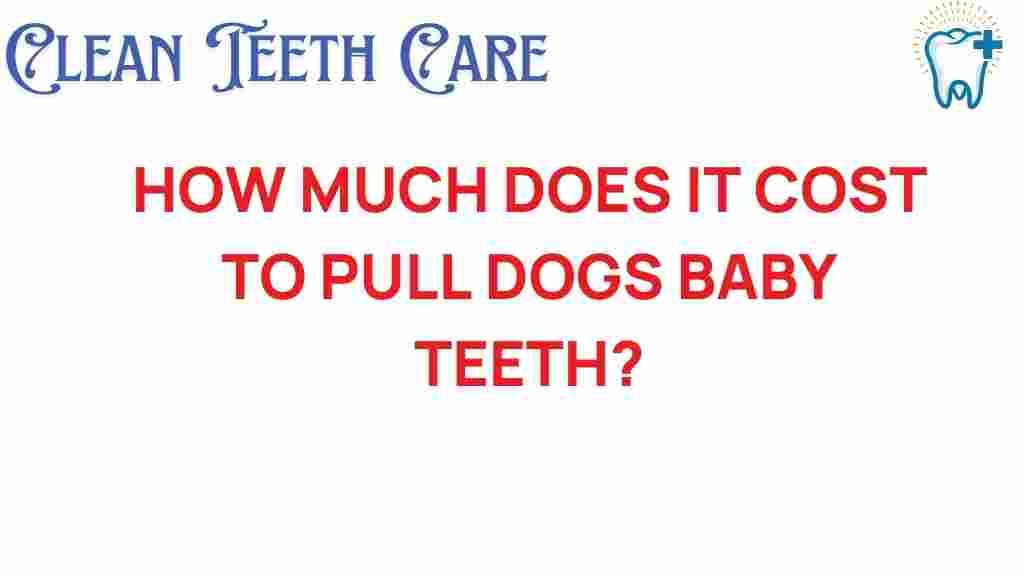The Surprising Costs of Extracting Your Dog’s Baby Teeth: A Deep Dive into Dog Dental Care
As a dog owner, ensuring your furry friend has a healthy mouth is essential for their overall well-being. One important aspect of dog dental care is the management of puppy teeth. While it might seem like a minor issue, the extraction of baby teeth can lead to significant veterinary costs and impact your pet’s health. This article will guide you through the costs associated with puppy teeth extraction, the importance of oral hygiene, and provide valuable dog owner tips for maintaining your dog’s dental health.
Understanding Puppy Teeth: Why Extraction Is Sometimes Necessary
Puppies typically have 28 baby teeth that begin to emerge at about three weeks of age. These teeth fall out as adult teeth come in, usually around six months. However, some puppies may experience complications that necessitate canine dental procedures, including:
- Retained Baby Teeth: Sometimes, baby teeth do not fall out as they should, leading to overcrowding and potential dental misalignment.
- Infection: A retained baby tooth can become infected, causing pain and discomfort.
- Jaw Issues: Misalignment can lead to jaw problems, affecting your dog’s ability to eat and play.
If you notice any issues with your puppy’s teeth, it’s essential to consult with your veterinarian. They may recommend puppy teeth extraction to prevent further complications.
Estimating Veterinary Costs for Puppy Teeth Extraction
One of the most significant considerations for any dog owner is the veterinary costs associated with dental procedures. The price for extracting puppy teeth can vary based on several factors:
- Location: Veterinary costs can differ by region. Urban areas often have higher prices compared to rural areas.
- Clinic Type: Specialty clinics may charge more than standard veterinary offices.
- Severity of the Case: If multiple teeth need to be extracted or if there are complications, costs will increase.
On average, you can expect to pay anywhere from $150 to $500 for puppy teeth extraction, including anesthesia and follow-up care. It’s crucial to discuss the estimated costs with your veterinarian before proceeding with any procedures.
The Importance of Oral Hygiene in Dogs
Good oral hygiene is vital in preventing dental problems in your dog. Regular dental care can help avoid the need for expensive procedures. Here are some effective ways to maintain your puppy’s dental health:
- Regular Brushing: Brush your puppy’s teeth several times a week with toothpaste designed for dogs.
- Dental Treats: Provide dental chews that can help reduce plaque and tartar buildup.
- Routine Vet Checkups: Schedule regular veterinary visits to monitor your dog’s dental health.
Implementing these tips can significantly reduce the likelihood of needing puppy teeth extraction in the future.
Pet Insurance: A Smart Move for Dog Owners
One way to mitigate the high costs of veterinary procedures, including dental care, is to invest in pet insurance. Many pet insurance plans cover dental health, including extractions. Here are some benefits of having pet insurance:
- Financial Protection: Insurance can help cover unexpected veterinary bills, providing peace of mind.
- Comprehensive Coverage: Many plans include dental care, which may cover routine cleanings and extractions.
- Access to Quality Care: With insurance, you’re more likely to seek veterinary care when necessary, ensuring your pet stays healthy.
Before choosing a plan, be sure to read the fine print regarding dental coverage. Some policies may have waiting periods or specific exclusions.
Step-by-Step Process of Puppy Teeth Extraction
If your veterinarian determines that your puppy needs teeth extracted, here’s what you can expect during the procedure:
- Pre-operative Assessment: Your veterinarian will examine your puppy and may conduct blood tests to ensure they are healthy enough for anesthesia.
- Anesthesia: Your puppy will be put under general anesthesia to ensure they are comfortable and pain-free during the procedure.
- Extraction: The veterinarian will carefully extract the necessary teeth, using specialized tools to ensure minimal discomfort.
- Recovery: After the procedure, your puppy will be monitored as they wake up from anesthesia. You may receive instructions for post-operative care.
Post-operative care is crucial for a successful recovery. Ensure you follow your veterinarian’s instructions regarding pain management and dietary restrictions.
Troubleshooting Common Concerns After Puppy Teeth Extraction
After your puppy undergoes teeth extraction, you may encounter some common concerns:
- Swelling or Discomfort: It’s normal for your puppy to experience some swelling. If it appears excessive, contact your veterinarian.
- Loss of Appetite: Many puppies may be hesitant to eat after the procedure. Offer soft food and monitor their intake.
- Bleeding: Minor bleeding can occur, but if it persists, seek veterinary advice.
Keeping a close eye on your puppy during their recovery will help ensure they heal properly and comfortably.
Conclusion: Prioritizing Your Dog’s Dental Health
Understanding the surprising costs of extracting your dog’s baby teeth highlights the importance of proactive dog dental care. By investing time in your puppy’s oral hygiene and considering options like pet insurance, you can prevent unnecessary veterinary costs and ensure your pet’s health and happiness.
Remember, regular checkups, dental care at home, and prompt attention to dental issues can save you money and help your puppy lead a healthy, comfortable life. For more tips on maintaining your dog’s health, check out our article on dog health maintenance.
By taking these steps, you’ll ensure that your pet enjoys a lifetime of good health and happiness!
This article is in the category Treatments and created by CleanTeethCare Team
